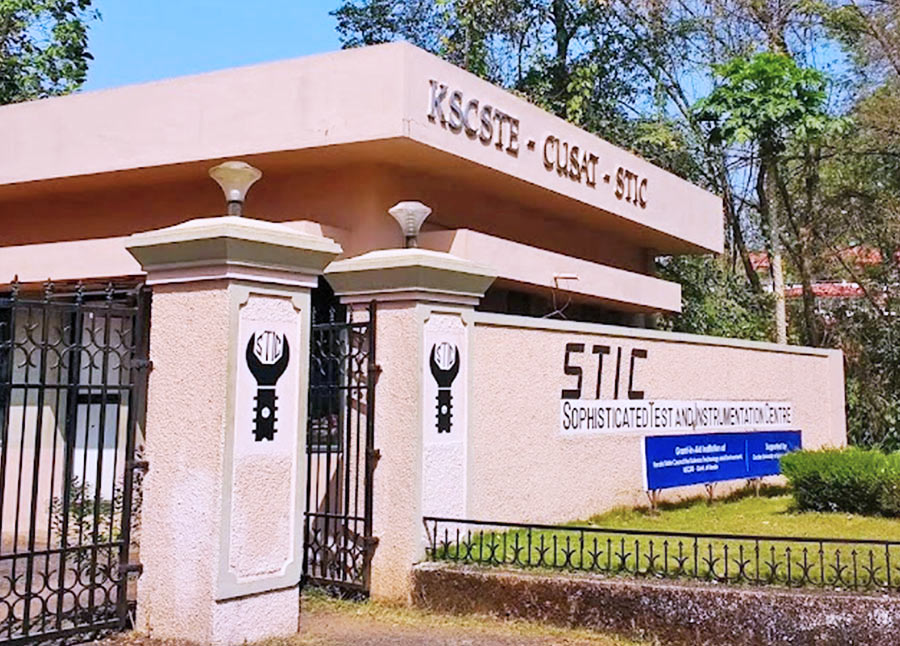 Sophisticated Test and Instrumentation Center is an Institution Sponsored Jointly by Kerala State Council for Science Technology and Environment(KSCSTE) and Cochin University of Science and Technology.
Sophisticated Test and Instrumentation Center is an Institution Sponsored Jointly by Kerala State Council for Science Technology and Environment(KSCSTE) and Cochin University of Science and Technology.
The objective of this institution is to assist the Industries, R&D organizations and Higher Education Centers by providing highly sophisticated testing and calibration facilities, material analysis facility, R&D support, consultancy services and training programs. The Calibration Laboratories of STIC are equipped with modern calibration instruments and standards that are traceable to National Standards. These laboratories are accredited by National Accreditation Board for Testing and Calibration Laboratories (NABL). STIC offers calibration services for Electro-Technical, Thermal and Mechanical parameters. The calibration services of STIC are made use of by industries, R&D Organizations and other Calibration Laboratories, mainly from South India.
The Sophisticated Analytical Instrument Facility (SAIF) of STIC is a facility for Researchers, Students and Industries who require Highly Sophisticated Analytical Instruments for Chemical, Atomic and Spectral Analysis of materials and chemical substances. This facility is sponsored by Department of Science and Technology Government of India. SAIF in STIC is the 12th such facility in the country.
STIC takes up R&D projects in the field of Instrument Development, and other support R&D work for Industries and Research Institutions. STIC also conducts occasional Training Programs/Seminars/Workshops in the areas of Instrumentation, Calibration, Analysis, Quality Management etc.
 Community Agrobiodiversity Centre (CAbC) was established in 1997 at Wayanad district of Kerala, as one of the regional centres of M.S. Swaminathan Research Foundation (MSSRF), Chennai, India. The Centre was established to promote community conservation systems of rural and tribal people through research, extension and advocacy. Centre works in partnership with rural and farming communities for sustainable agricultural and rural development. The activities are designed in such a way that promotes a pro-nature, pro-poor, pro-woman and a pro-livelihood orientation to technology development and dissemination.
Community Agrobiodiversity Centre (CAbC) was established in 1997 at Wayanad district of Kerala, as one of the regional centres of M.S. Swaminathan Research Foundation (MSSRF), Chennai, India. The Centre was established to promote community conservation systems of rural and tribal people through research, extension and advocacy. Centre works in partnership with rural and farming communities for sustainable agricultural and rural development. The activities are designed in such a way that promotes a pro-nature, pro-poor, pro-woman and a pro-livelihood orientation to technology development and dissemination.
Kerala State Council for Science, Technology and Environment (KSCSTE) has recognized the Community Agrobiodiversity Centre of M.S. Swaminathan Research Foundation as one of the Grant-in-Aid institutions. The support was extended mainly to strengthen the agrobiodiversity initiatives of the Centre across Kerala state. This includes research and extension services for building models on the conservation and sustainable utilization of agro-bioresources of the State. The support for the Centre has confined under five different heads of accounts that are Community Agrobiodiversity, Wild Biodiversity, Climate Action towards adaptation, Sustainable Village Development and Community Knowledge & Skill development.
 Integrated Rural Technology Centre (IRTC) is an autonomous research and development institution founded by the Kerala SastraSahithyaParishad (the pioneering People’s Science Movement) and a grant-in-aid institution of the Kerala State Council for Science, Technology and Environment (KSCSTE). IRTC envisions the upliftment of the underprivileged sections of the society through knowledge sharing, appropriate technology transfer and skill development. The institution intervenes to meet the new age challenges and find sustainable solutions in the sector of solid waste management, watershed development, energy management, local planning and livelihood. IRTC has played a pivotal role in handholding the local self-government institutions across the state through their project implementation and consultancy support for preparing Detailed Project Reports for various developmental programmes. IRTC has extensively involved in research, innovation and extension activities to empower the marginalized communities across the state. It has also marked its footprints in the areas of women and child development with the collaboration of national and international agencies such as WHO, UNICEF and UNDP.
Integrated Rural Technology Centre (IRTC) is an autonomous research and development institution founded by the Kerala SastraSahithyaParishad (the pioneering People’s Science Movement) and a grant-in-aid institution of the Kerala State Council for Science, Technology and Environment (KSCSTE). IRTC envisions the upliftment of the underprivileged sections of the society through knowledge sharing, appropriate technology transfer and skill development. The institution intervenes to meet the new age challenges and find sustainable solutions in the sector of solid waste management, watershed development, energy management, local planning and livelihood. IRTC has played a pivotal role in handholding the local self-government institutions across the state through their project implementation and consultancy support for preparing Detailed Project Reports for various developmental programmes. IRTC has extensively involved in research, innovation and extension activities to empower the marginalized communities across the state. It has also marked its footprints in the areas of women and child development with the collaboration of national and international agencies such as WHO, UNICEF and UNDP.

